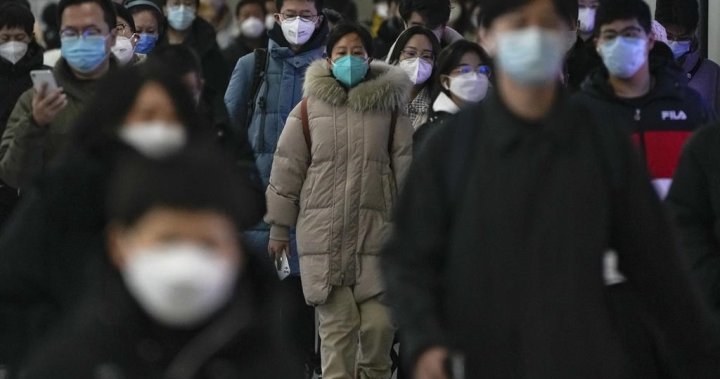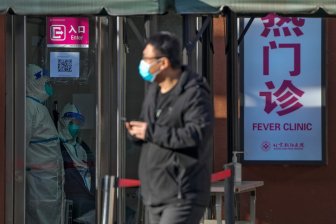Can health care withstand a new COVID-19 variant? WHO fearful as China sees cases soar – National | Globalnews.ca
There are still “huge weaknesses” in the world’s health-care system that could be exposed if a new COVID variant takes dominance, a WHO official said Wednesday.
Dr. Mike Ryan, executive director of the WHO Health Emergencies Programme, told reporters during a news conference in Geneva, Switzerland, that he doesn’t think the world is ready to “take the hit” of another wave of a new COVID variant, amid concerns in China over rapidly growing infections there.
“We have health workers who are tired. The incidence of PTSD and social anxiety syndromes in health workers is very high. Many health workers are leaving the field,” he said.
“Health workers have seen their incomes fall behind as they have worked hard at the frontline. As the economic crisis hit, they were left behind and they’re now looking at the stark future of less pay for more work, more stress, for less recognition, and many are choosing to leave the field.
“Are we ready to take the hit of another wave of a new variant that might emerge? I don’t think so.”
Read more:
China races to boost health system as COVID-19 surge sparks global concern
Read More
-
![]()
China races to boost health system as COVID-19 surge sparks global concern
For close to three years, health-care systems across the world have dealt with wave after wave of COVID-19 infections. COVID-19 vaccines have reduced the likelihood of severe outcomes, but given immunity wanes, health officials — including those in Canada — have urged for the population to stay up-to-date on their vaccinations to protect the health-care system.
Health experts are growing worried over the COVID-19 situation in China. Beijing recently began easing some strict measures implemented as part of its “zero COVID” system following unprecedented protests calling for their removal.
The implementation of zero COVID came at a big cost to Chinese society and the world’s second-largest economy, but as the virus begins to spread rapidly among the country’s 1.4 billion population, fears are growing over possible deaths, variants and the impacts on the economy and trade.
“Every new epidemic wave in another country brings the risk of new variants, and this risk is higher the bigger the outbreak, and the current wave in China is shaping up to be big,” said Alex Cook, vice-dean for research at the National University of Singapore’s Saw Swee Hock School of Public Health, in a recent interview with Reuters.
“However, inevitably China has to go through a large wave of COVID-19 if it is to reach an endemic state, in a future without lockdowns and the economic and political damage that results.”
Read more:
China brings COVID-19 vaccination drive to villages as infections surge
U.S. State Department spokesperson Ned Price said Monday the potential for the virus to mutate as it spreads in China was “a threat for people everywhere.”
China has been racing to not only shore up its health-care system, but increase vaccination among the population.
China’s health authority pledged last month to make a concerted effort to increase vaccinations among the over-60 population, promising to deploy specialist vehicles and set up temporary clinics in villages and communities in order to boost coverage rates, which have lagged among the elderly.

Ryan said China is “recommitting” itself to the vaccination strategy, and given the size of China’s population, increased vaccination is in the “interest” of many people on the planet.
However, even though China is dealing with a severe COVID outbreak, that doesn’t mean that other nations in the world are in the clear, Ryan said.
Countries that have dropped testing measures are “leaving us blind,” and there are “huge weaknesses” that remain in the health-care system, he said.
“We haven’t fixed the oxygen problem. We haven’t fixed the ICU problem. We haven’t fixed the out-of-pocket expenses that people suffer when they get very sick,” Ryan said.
“One severe illness in many families in this world will impoverish that family for generations. That’s the reality that people face, and they face desperate decisions. … There is gross injustice in the way people access health care, and the ways in which they can.”
Read more:
Canada could see COVID-19 uptick in new year, country’s top doctor warns
During his opening remarks, WHO Director-General Dr. Tedros Adhanom Ghebreyesus said 2023 could be the year that the emergency phase of the COVID-19 pandemic ends.
But in order to get there, countries must maintain high levels of vaccination, Ryan said.
“Vaccination is so central. It really is the get-out-of-jail card. We need it and remains to be so,” he said.
“But it’s not good unless we use it, really and truly, it doesn’t do any good. It’s not about vaccines, it’s about vaccination.”
— with files from Reuters
© 2022 Global News, a division of Corus Entertainment Inc.
For all the latest health News Click Here







